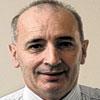
One of Them: From Albert Square to Parliament Square
Michael Cashman
Bloomsbury £18.99
Review by Hugh MacDonald
TO the many, Michael Cashman will be known as the actor who played the first gay character on EastEnders. To his publishers, he is “one of the greatest living figures in modern Britain”.
The first is an inadequate description, the second an overblown one. The measure of Cashman lies somewhere between superficial celebrity and exaggerated prominence. He has, though, lived a life that has taken him from poverty in the East End of London to the House of Lords. He has played a leading role in the protection and introduction of LGBT rights. He has filmed with Elizabeth Taylor, watched Sylvester Stallone and Richard Gere joust petulantly for the attentions of Princess Diana, fell out and back in with Ian McKellen and dined and partied with Elton John. He could be denigrated as a lord of luvviedom but he is so much more.
There is brilliance in his memoir, One of Them, and darkness, too. These elements are intermittent but enough to raise it far above the normal standard of celebrity biography. There are times when Cashman wanders off into recollections of steam baths and gay pubs, speed and booze, promiscuity and excess. But these seem quaintly confessional rather than deeply shocking. There are the celebrity moments, with the best revealing Alastair Sim as a great, humble and principled man.
However, above all this is a biography of a life of substance.
The opening and ending of the book are stunning. A Dickensian London is evoked long after the death of Charles. A young Cashman is sexually abused by a stranger, left bereft and ashamed. The story moves quickly to revelation. One of Them is a reference to his mother’s comment when Cashman’s homosexuality seems to become apparent at a dance class. At 12, he is enlisted into West End shows, left to the whims of sexual predators and set adrift on a life where his talent and looks are both an economic boon to a poor family and a lure for evil men.
This world is mercilessly recreated. Cashman is frank but seeks no pity. The lucidity of the writing is breath-taking. The most awful events are shrouded in the evocations of a London past, of pubs with pianos, mothers with debtors at the door, feckless fathers. But the horrors peek through this haze with a deeply ironic brilliance.
Similarly, the latter stages are powerful. The recollections of Cashman's mother and father on their deathbeds are moving and made all the more poignant by his efforts at understanding grievous failings. The chronicle of the death of his long-time partner stands as a finely-wrought testament to grief and a vigorous exposition of what it is to have loved then lost.
These deeply personal episodes take the reader to a London long lost but also a personal landscape that can be recognised. The trials of Cashman’s life are mercifully beyond the ken of most but his search for approval, his continual restlessness, his failure to find confidence in success must be familiar to many.
These quiet revelations, the strength of his early memories and the power of his parental reminiscences overwhelm the rest of the book. His work for gay causes is worthy and brave. His career as an MEP must be respected. But they jostle for impact with characters and incident that are recalled with the facility of a writer of genuine talent.
The pace and power of the book oscillates wildly. How can one move from the evil perpetrated in a dank dockside to a jolly jape at a Barbara Windsor party?
Both, of course, are a part of Cashman’s life but he has, perhaps, attempted to do too much in one biography. He could never be accused, though, in life or literature, of not doing enough.



Why are you making commenting on The Herald only available to subscribers?
It should have been a safe space for informed debate, somewhere for readers to discuss issues around the biggest stories of the day, but all too often the below the line comments on most websites have become bogged down by off-topic discussions and abuse.
heraldscotland.com is tackling this problem by allowing only subscribers to comment.
We are doing this to improve the experience for our loyal readers and we believe it will reduce the ability of trolls and troublemakers, who occasionally find their way onto our site, to abuse our journalists and readers. We also hope it will help the comments section fulfil its promise as a part of Scotland's conversation with itself.
We are lucky at The Herald. We are read by an informed, educated readership who can add their knowledge and insights to our stories.
That is invaluable.
We are making the subscriber-only change to support our valued readers, who tell us they don't want the site cluttered up with irrelevant comments, untruths and abuse.
In the past, the journalist’s job was to collect and distribute information to the audience. Technology means that readers can shape a discussion. We look forward to hearing from you on heraldscotland.com
Comments & Moderation
Readers’ comments: You are personally liable for the content of any comments you upload to this website, so please act responsibly. We do not pre-moderate or monitor readers’ comments appearing on our websites, but we do post-moderate in response to complaints we receive or otherwise when a potential problem comes to our attention. You can make a complaint by using the ‘report this post’ link . We may then apply our discretion under the user terms to amend or delete comments.
Post moderation is undertaken full-time 9am-6pm on weekdays, and on a part-time basis outwith those hours.
Read the rules here